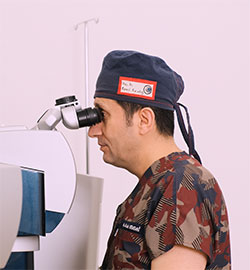
Sixth nerve palsy refers to a condition where the abducens nerve (sixth cranial nerve) is affected.
MORE...
Fourth nerve palsy refers to a condition where the trochlear nerve is affected.
MORE...
Fourth nerve palsy refers to a condition where the trochlear nerve is affected.
MORE...
Hypertropia refers to a type of strabismus where one eye turns upward in relation to the other eye.
MORE...
Hypotropia refers to a type of strabismus where one eye turns downward in relation to the other eye.
MORE...
Overaction of the inferior oblique muscle refers to a condition resulting from the imbalance of eye muscles.
MORE...
Strabismus is a condition where a person's two eyes do not align with the same point of focus.
MORE...
Strabismus surgery is a surgical intervention performed to correct the problem of strabismus caused by the irregular functioning of eye muscles.
MORE...
Third nerve palsy refers to a condition where the third cranial nerve (oculomotor nerve) is affected.
MORE...